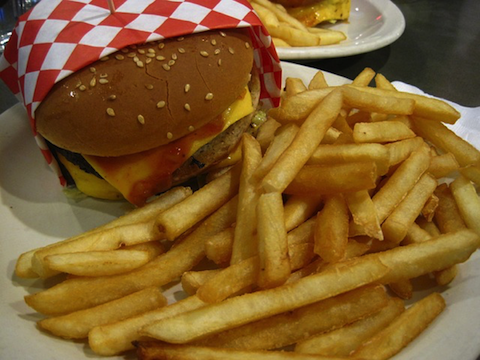
A new food and mental health study has been published in the international BMC Medicine journal: Western diet is associated with a smaller hippocampus: a longitudinal investigation. The lead author is Associate Professor Felice Jacka from Deacon University in Australia.
Here is the conclusion of the study:
Lower intakes of nutrient-dense foods and higher intakes of unhealthy foods are each independently associated with smaller left hippocampal volume. To our knowledge, this is the first human study to demonstrate associations between diet and hippocampal volume concordant with data previously observed in animal models.
Study participants were Australian adults aged 60-64. The results of the study, show that an unhealthy “Western” diet is associated with a smaller left hippocampus and a healthier “prudent”, nutrient-dense diet is associated with a larger left hippocampus.
The unhealthy “Western” diet was:
characterized by the consumption of roast meat, sausages, hamburgers, steak, chips, crisps and soft drinks
and the healthy “prudent”, nutrient-dense diet was:
characterized by the consumption of fresh vegetables, salad, fruit and grilled fish
This study has importance for cognition and mental health, both depression and very possibly anxiety too:
extensive evidence from animal studies points to the importance of the hippocampus in the association between diet and mental and cognitive health
The hippocampus is a brain structure associated with both learning and memory, as well as mood regulation, and is specifically implicated in depression
The study does group high sugar and high saturated fat together, and unfortunately the healthy diet excludes good quality red meat which is surprising considering previous research and conversations with Dr. Jacka about the benefits of good quality red meat and mental health:
In our study, out of every single dietary food grouping that I looked at including vegetables, fruits, salads, beans, etc the strongest correlate of mental health was red meat intake [grass-fed red meat of course]
Consistently, women who have less than the recommended intake of red meat seem to be in an increased risk for common mental disorders [like anxiety and depression] and bipolar disorder.
It will be wonderful to see follow-up research looking at the effect of quality grass-fed red meat on hippocampus size.
Drew Ramsey, MD, an assistant clinical professor of psychiatry at Columbia University College of Physicians and Surgeons in New York City, described the study as “exciting” in an interview on Medscape Medical News:
It’s the first time that a dietary pattern has been linked to specific changes in the brain. We’ve known for a long time that there’s a correlation between dietary pattern and the risk of a number of brain illnesses, like depression and dementia, and the mechanism behind this, we believe, involves neuroplastic processes of how food affects brain growth. This is the first study that’s really shown that quite conclusively.
Dr. Ramsey is the author of The Happiness Diet, and co-founder of National Kale Day. His mission is to educate America on eating healthier and I’ll second what he said about this study:
nutrition should be incorporated into mental health clinical practice.
How wonderful is it to hear a statement like this from a psychiatrist!?
You can read the complete study here.
What does all this mean for you? Eat real whole nutrient-dense food and ditch the junk food and processed food. Your brain will be happy and so will you be!
If you’re a mental health practitioner, start talking to your clients and patients about what they’re eating, ask them what they had for breakfast and share this research.
Leave a Reply